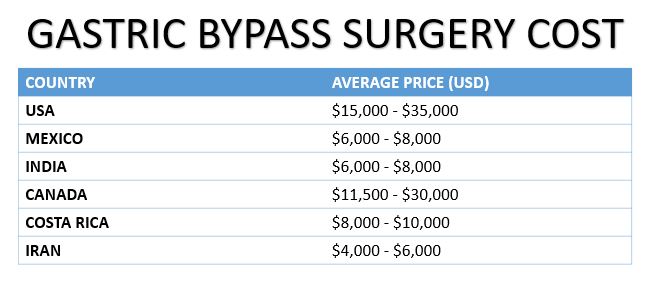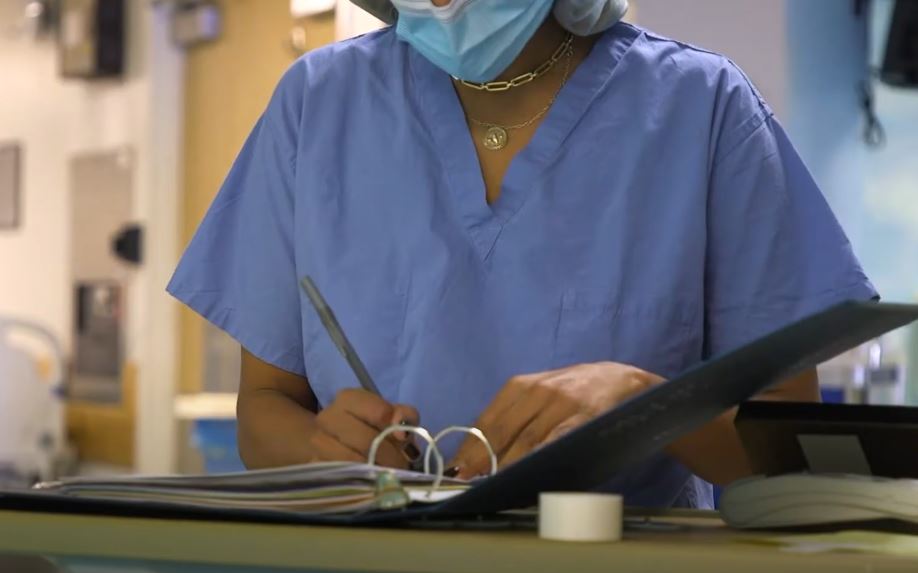Gastric bypass surgery cost
Gastric bypass surgery is a popular weight loss procedure for those struggling with obesity, offering a potential path to a healthier life. However, one of the biggest considerations for anyone looking into this surgery is the cost. The price can vary widely depending on a variety of factors, including location, surgeon expertise, and the type of facility where the procedure is performed.
Key factors influencing gastric bypass surgery cost
The cost of gastric bypass surgery is not a one size fits all figure; it can range from around $15,000 to over $35,000 in the United States. Here are the main factors that can impact the total cost:
- Geographical location: The price can differ significantly depending on where you live or choose to have the surgery. Major cities and regions with a higher cost of living generally charge more for the procedure. For example, costs in New York or California might be higher compared to those in rural areas or smaller towns.
- Surgeon’s experience: Surgeons with more experience or a well known reputation in bariatric surgery may charge higher fees. Their expertise, however, can also mean a lower risk of complications, which might justify the additional cost.
- Type of facility: Whether the surgery is performed in a hospital or an outpatient surgical center can affect the cost. Hospitals typically have higher overhead costs, which can translate to higher fees for the procedure.
- Additional expenses: Preoperative tests, consultations, and follow up care can add to the overall cost. It’s important to consider these when budgeting for the surgery, as they are essential parts of the treatment process.
How much does gastric bypass surgery cost abroad?
The cost of gastric bypass surgery varies not only within the United States but also internationally. Here’s a quick comparison of average prices across different regions:
- United States: $15,000 – $35,000
- Mexico: $6,000 – $8,000, often attracting those looking for more affordable options abroad.
- Canada: Prices vary widely, ranging from about $11,500 to $30,000 USD.

These figures highlight the importance of considering location as a major factor in your decision making process. Traveling for surgery might seem like an attractive way to save money, but it’s crucial to factor in travel costs, potential language barriers, and the quality of postoperative care.
Remember, you’ll need to account for travel and accommodation costs, and you should also plan for potential follow ups either abroad or back home. It’s crucial to research the facility and the surgeon thoroughly to make sure you’re in safe hands.
Financing options for gastric bypass surgery
Paying for gastric bypass surgery can be a major concern, especially if you don’t have insurance that covers bariatric procedures. Here are some financing options that can help make the surgery more accessible.
Insurance coverage
Some insurance plans cover part or all of the cost of gastric bypass surgery, but this depends on the specific policy and whether you meet the eligibility criteria. It’s essential to check with your insurance provider about what’s covered, and if needed, work with your surgeon’s office to appeal any denied claims.
Payment plans
Many clinics and hospitals offer financing options or payment plans that allow you to pay for the surgery over time. This can help spread the cost over several months or years, making it more manageable.
Medical loans
Several companies specialize in medical loans specifically for procedures like gastric bypass. These loans typically offer fixed rates and terms, allowing you to budget your repayments without surprises.
Long-term benefits
While the upfront cost of gastric bypass surgery can be daunting, it’s important to consider the long-term benefits that can offset these expenses. Beyond the immediate weight loss, this bariatric surgery can lead to significant health improvements, reducing the need for medications and other treatments for obesity-related conditions such as diabetes, hypertension, and sleep apnea.
For many, the surgery can lead to a dramatic improvement in quality of life, increased energy levels, and a reduction in the risk of serious health issues. Over time, these benefits can translate into financial savings on healthcare costs, making the investment in surgery a potentially life-changing decision.
Gastric bypass surgery preparation
Getting ready for gastric bypass surgery isn’t just about booking the date it’s a process that involves both your mind and body. Before the surgery, your doctor will probably run a bunch of tests, like blood work and maybe some imaging, just to make sure everything’s in good shape. You might also chat with a dietitian and a psychologist, which might sound a bit much, but it’s all about making sure you’re fully prepared for the big change ahead.
Expect to go on a special pre-surgery diet that’s high in protein and low in carbs and fats to help shrink your liver, which can make the surgery safer. Also, if you smoke or drink, now’s the time to quit since it can complicate things. Prepping your home for recovery is a smart move, too. Set up a cozy spot where you can rest, have some easy-to-make meals ready, and maybe ask a friend or family member to help you out for a few days post-surgery.
Gastric bypass recovery
Recovering from gastric bypass surgery isn’t a one size fits all deal, but here’s a general idea: you’ll probably spend a couple of days in the hospital and then head home. At first, you’ll be on a liquid diet think broths and protein shakes. Slowly, you’ll graduate to soft foods and eventually, regular meals. Just remember, baby steps!
Returning to work can happen as soon as two weeks if your job is more desk oriented, but if it’s physically demanding, it might be closer to four weeks. Gentle walking is usually encouraged pretty early on to help with blood flow and to prevent clots, but avoid anything too intense until you get the all-clear from your doctor. Keep up with your follow ups these appointments are your chance to tweak anything that’s not feeling right and make sure you’re on track.
Gastric bypass side effects
After gastric bypass, there are some side effects that most people encounter, but knowing about them can help you be better prepared. You might feel queasy, or find yourself dealing with something called dumping syndrome basically, food moving through your system a bit too fast, which can leave you feeling pretty crummy for a little while.
You could also run into some nutritional gaps, especially with things like iron, calcium, and certain vitamins, which is why you’ll need to keep up with supplements. Other side effects might include changes in your bathroom habits, but these usually settle down as your body adjusts. Serious complications are less common but can happen, so staying in touch with your healthcare team is key.
How soon will I see the results of gastric bypass surgery?
One of the most exciting parts of having gastric bypass is seeing those first results, and trust me, they can come pretty quickly. Most people start noticing weight loss within a few weeks. By the six month mark, it’s not unusual to have lost a significant amount of weight sometimes up to 60% of excess weight in the first year alone.
It’s not just about the numbers on the scale, though. Conditions like type 2 diabetes and high blood pressure often start to improve within the first few months, which can be a huge relief. Just remember, everyone’s journey is different, and the best results come when you stick to your post-surgery plan with diet, exercise, and those all-important follow-up visits.
Skin removal and other procedures
Significant weight loss is fantastic, but it can leave you with some excess skin that doesn’t quite snap back. This loose skin can be uncomfortable or even cause some hygiene issues. If it bothers you, there are procedures like a tummy tuck or arm lift that can help tidy things up.
These types of surgeries are usually considered cosmetic, so they might not be covered by insurance, and it’s worth discussing all this with a plastic surgeon who has experience with post-weight loss patients. They’ll help you figure out what’s best for you and when the right time would be to consider these options.
What is a post-gastric bypass diet?
Your diet after gastric bypass is not just about eating less it’s about eating right to help your body heal and lose weight safely. Right after surgery, you’ll start with clear liquids, like water and broth, and then move on to full liquids such as protein shakes. From there, it’s on to pureed foods, and finally, solid foods, but it all happens gradually over about eight weeks.
You’ll want to focus on high protein, low sugar, and low fat foods, chewing everything really well to help your smaller stomach do its job. Certain foods, especially those high in sugar and fat, are best avoided to keep everything running smoothly and to prevent those uncomfortable side effects like dumping syndrome.
Risks of gastric bypass surgery
Every surgery comes with its risks, and gastric bypass is no different. Short-term risks include things like infection, blood clots, or reactions to anesthesia, but there are also some long term considerations. Dumping syndrome, for example, can make eating certain foods quite uncomfortable, and nutritional deficiencies are a common issue because of how your body absorbs nutrients differently after surgery.
It’s also possible to develop issues like ulcers or bowel obstructions down the line. It’s important to keep an open line of communication with your healthcare team so you can tackle these risks head on and manage any complications that might arise.
Frequently asked questions
Is gastric bypass usually covered by insurance?
Insurance can often cover gastric bypass, but it usually requires proof that it’s medically necessary think BMI criteria and related health conditions like diabetes. Each insurance plan is different, so you’ll want to double-check with your provider to understand what’s covered and what hoops you might need to jump through.
How much weight do you need to lose to get gastric bypass surgery?
There isn’t a specific weight you need to lose before surgery, but generally, if your BMI is 40 or higher, or if it’s at least 35 with serious health issues related to obesity, you could be a candidate. Some doctors might ask you to lose a little weight beforehand to help with surgery outcomes, but it’s more about your overall health picture.
Is it hard to qualify for gastric bypass surgery?
Qualifying for gastric bypass does involve meeting certain medical criteria, which can feel like a lot. You’ll need to have tried other weight loss methods, have a qualifying BMI, and pass a psychological evaluation to ensure you’re ready for the lifestyle changes ahead. It might sound like a big hurdle, but it’s all in place to help ensure your success and safety.
Can you get gastric bypass at 200 lbs?
It depends more on your height and overall health rather than just your weight. If your BMI meets the criteria and you have weight related health conditions, you could potentially qualify. The best step is to have a consultation with a bariatric specialist who can provide guidance based on your specific circumstances.
How fast can I lose 100 pounds after gastric bypass?
Losing 100 pounds is totally doable after gastric bypass, especially within the first year or so, but how fast it happens depends on your dedication to diet, exercise, and your body’s unique response to the surgery. Regular follow ups with your healthcare team will help keep you on track and adjust your plan as needed.
What disqualifies you from bariatric surgery?
Certain conditions like uncontrolled mental health disorders, active substance abuse, or severe health risks could disqualify someone from surgery. It’s also important to show that you’re committed to making the necessary lifestyle changes. Each case is unique, so your doctor will be the best person to evaluate your individual situation.
How fast can you get approved for weight loss surgery?
Approval times can vary, but generally, the whole process from initial consultation to insurance approval might take a few months. This includes meeting with various healthcare professionals, completing any required preoperative programs, and handling all the paperwork. If all goes smoothly, some people can get through it faster, especially if they’ve already met some of the preliminary requirements.
Learn more about our weight loss surgery services at Bariatrics MX:











